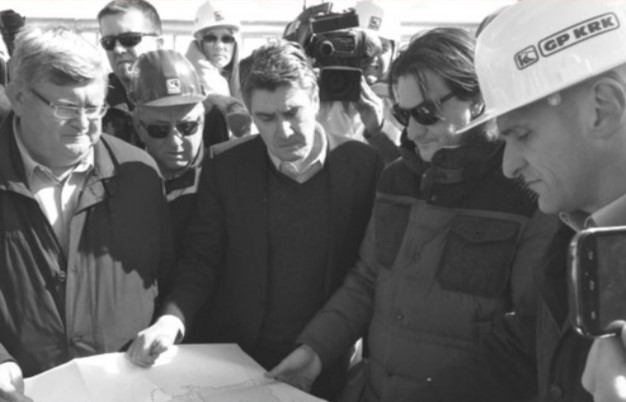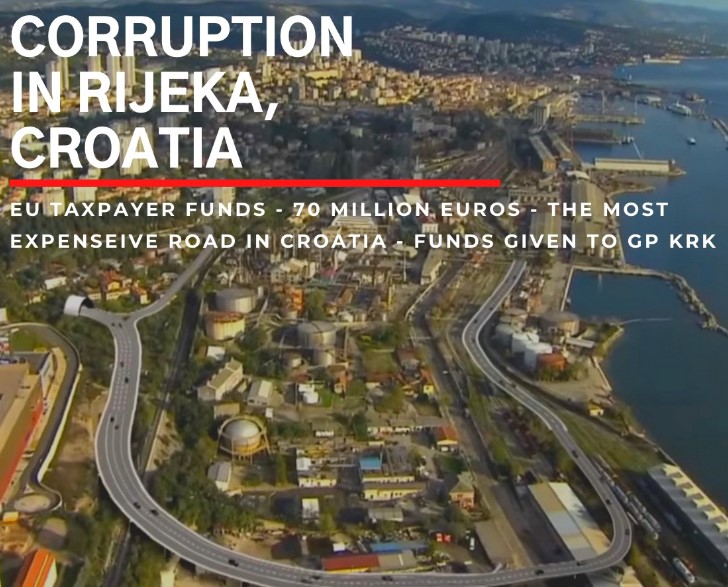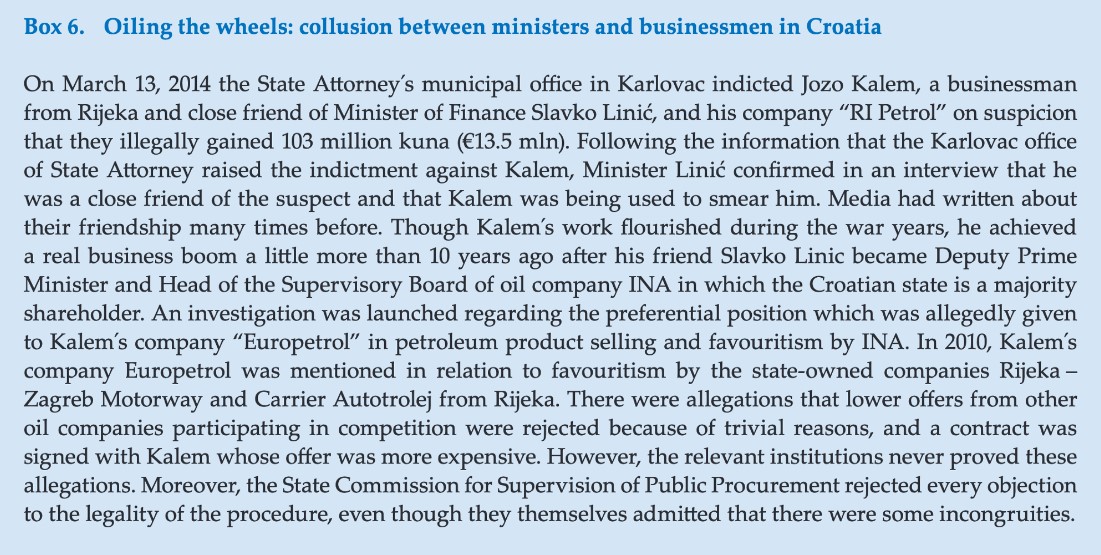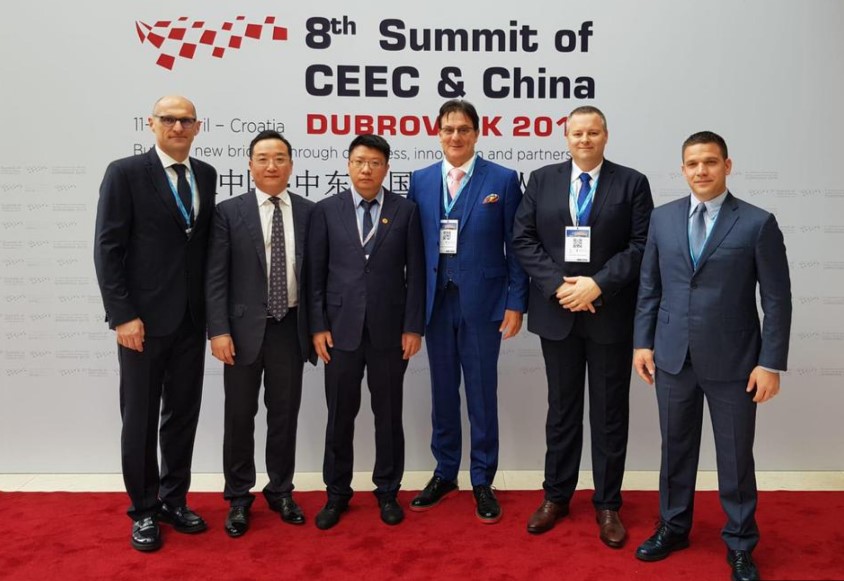RIJEKA – EU CAPITAL OF CORRUPTION 2020.

By: Natasha Srdoc
Photo: International Leaders Summit
US and EU taxpayer funds— sustain corrupt networks in the City of Rijeka — and block legitimate private investments.
European Union (EU) and US taxpayer funds, kleptocracy and money laundering have kept two mayors in the city of Rijeka in power for the last 30 years. These mayors have made the City of Rijeka entirely dependent on free money (US and EU taxpayer grants), cheap money (US and Europe’s taxpayer loans via the World Bank) and stolen monies (money laundering of illicit gains). The construction company GP Krk does all the construction for the old boys’ network.
Inadvertently, the unintended consequences of the EU and US “free and cheap money (taxpayer funds)” in Croatia are the further erosion of the rule of law, absence of independent judiciary and lack of protection of property rights, which can not take hold in this Balkan mafia state.
The decades long criminal conduct by the City’s officials have deprived citizens of honest services, while enriching the City’s officials and their private partners in crime through:
1. Racketeering enterprise.
2. Engaging in criminal breach of trust, public corruption, embezzling public funds.
3. Confiscating privately-owned land to benefit themselves and their friends.
4. Soliciting bribes and trading in influence.
5. Hiding beneficial ownership through secret partnership agreements and off-shore companies.
CROATIA’S FAKE JUDICIARY
Croatia’s judicial independence was ranked 126th out of 141 countries in the 2019 Global Competitiveness Report presented by the World Economic Forum (WEF). The worst-rated EU-member country has been falling further behind non-EU member states including Russia, Ukraine and Serbia.

The City of Rijeka — once USAID’s Partner City in the Local Government Project — is now luring communist China’s state-owned companies to invest in the City.
Everyinfrastructure and construction project in Rijeka, and beyond, which is funded by US, EU and Croatia’s taxpayers, as well as by monies of suspect origin, is subcontracted to the local construction company GP Krk, whose ownership is kept secret. The beneficiaries of the EU and US taxpayer funds may change, whether it is — City of Rijeka, Port of Rijeka Authority, Croatian Roads, Water and Sewarage Company, Croatian Waters, Primorsko-Goranska County, LNG, etc. — there is always one company that receives every construction contract — GP Krk.
The Croatian-based GP Krk performs all construction for real estate investments funded by laundered monies. GP Krk conceals its owners, receives illegal subsidies, inspects its own construction and usurps private property in collusion with the City’s mayor and urban planning heads. GP Krk is also a major political campaign contributor.
Rijeka, a coastal city on the Adriatic Sea in Croatia was proclaimed the EU Capital of Culture 2020. The EU Capital of Corruption is a much better suited name for the City of Rijeka, which has been mismanaged by two city mayors in the last 30 years: Slavko Linic (1990–2000) and Vojko Obersnel (2000-present). They have been prominent left-of-center SDP political party members, getting away with grand corruption.
During periods of time when SDP was in power at the national level, this corrupt network extended, covering the entire country.
Mayor of Rijeka Vojko Obersnel opposed the European Union’s (EU) cuts to cohesion funds and centralizing governance under the Just Transition Fund in January 2020, with a warning, “We’ll fight together with the European Parliament and all cohesion stakeholder to avoid this outcome.”
The World Bank (WB) loaned over $330 million for Rijeka Gateway Project during 2003–2018, most of which was subcontracted to the construction company GP Krk, known to regularly increase initial bids by 25%.
EU and US taxpayers are sustaining cronyism and pay-to-play scheme in the City of Rijeka — a microcosm of Croatia:
I) Rijeka City/GP Krk — Wasteful Spending of EU and US Taxpayers Aid.
II) GP Krk Illegally Supervising Its Own Construction.
III) Rijeka City/GP Krk Blocking Private FCPA-Abiding US Investment.
IV) Rijeka City/GP Krk Facilitating Money Laundering.

RIJEKA CITY/GP KRK – WASTEFUL SPENDING OF EU AND US TAX PAYERS AID
1) Announced on May 5, 2020 — GP Krk will be building Croatia’s “most expensive road” paid by €70 million EU taxpayer funds:
2) Over €101 million of EU taxpayers to be spent for the controversial LNG project, with additional €100 million by Croatia’s taxpayers — built by GP Krk:

3) EU taxpayers giving over €170 million to the City of Rijeka, Water and Sewerage Company and Croatian Roads, through EU Cohesion Fund for “Reconstruction of the road, upgrading the wastewater system and improving the existing drainage system”, to be built by GP Krk.

4) With over €500 million of EU taxpayer funds spent, there is a reason for the Port of Rijeka Authority to celebrate a new project worth €6.5 million with GP Krk.

5) With Rijeka becoming the “EU Capital of Culture 2020”, construction company GP Krk is involved in the building project of Rijeka’s library and “Children’s Home” aka “Revitalization of the Complex Bencic — Cigleni and T-structure” funded by EU taxpayers in the amount over €9 million. Croatia’s taxpayers are contributing additional €12.5 million.

6) Through “Rijeka — EU Capital of Culture 2020”, EU taxpayers are now paying over €20 million for Mayor Vojko Obersnel’s pet projects, including the renovation of the communist Yugoslavia dictator Tito’s ship which is being converted into a museum. Croatia’s taxpayers are contributing additional €1.7 million:

7) The US and Western European nation’s taxpayers funding via the World Bank.
According to its website, the World Bank has supported more than 50 operations in Croatia amounting to over US$4.8 billion.
The World Bank loaned over $330 million for Rijeka Gateway Project during 2003–2018, most of which was subcontracted to the construction company GP Krk, known to regularly increase initial bids by 25%.

8) It is GP Krk, which is building the long overdue hospital, project worth €117 million.
9) Projects funded by European Bank for Construction and Development (EBRD) through Croatian Bank for Reconstruction and Development (HBOR).
The Croatian Bank for Reconstruction and Development (HBOR) is refusing to submit the list and pertinent details for the loans provided to HBOR borrowers. Over €10 billion of EU and US taxpayer funds will have been spent, without any accountability. From the HBOR’s website: “For the period 2014–2020, Croatia has been allocated EUR 10.6 billion from the European Structural and Investment Funds. The goal of HBOR is to facilitate and promote the absorption of grants from the EU funds and to indirectly contribute to the sustainable development and balanced economic growth of the Republic of Croatia.”
Slavko Linic was mayor of the city of Rijeka (1990-2000), Croatia’s Deputy Prime Minister, Minister of Economy and Head of the Privatization Fund (2000–2003); and as Minister of Finance (2011–2014) represented Croatia on the EBRD board (European Bank for Reconstruction and Development, which is also funded by US taxpayer dollars).
With Croatia becoming an EU member, Linic became a new EIB (European Investment Bank) Governor for the Government of Croatia. Linic’s name is tied to illicit enrichment of individuals in the oil business in Croatia including Jozo Kalem:

While he was Finance Minister, Linic was involved in a massive pre-bankruptcy procedure scheme, forgiving debts to his friends.
Linic used his position at the Croatia’s Bank for Reconstruction and Development (HBOR — financed by EBRD, which is also funded by US taxpayer funds) to give loans to his friends (not qualifying) at below market interest rate. He was accused of a sale of valuable state-owned assets, below-market prices, to his associates and co-conspirators (which are criminal offenses punishable by Croatia’s Criminal Code).
GP KRK ILLEGALY SUPERVISING ITS OWN CONSTRUCTION
GP Krk and connected companies are supervising/inspecting their own construction — which is against the law in rule of law countries (safety risk/conflict of interest). Although the self-inspection is illegal in Croatia, this issue can not been rectified.
The construction site of two 8-story residential buildings, May 25, 2018 in Rijeka:

The extract from Croatia’s company registry (below) shows that the investor, contractor and supervisor are connected companies owned and managed by the same person — Josip Puric :

RIJEKA CITY/GP KRK BLOCKING PRIVATE FCPA-ABIDING US INVESTMENT
Foreign Corrupt Practices Act (FCPA) prohibits US investors to bribe foreign government officials. Extortion Racket — In collusion with the Rijeka’s mayor Vojko Obersnel and the city’s head of urban planning, Srdjan Skunca, GP Krk drafted a plan, paid by Rijeka’s taxpayers, damaging private owners and blocking private US investors which abide by Foreign Corrupt Practices Act (FCPA).
City of Rijeka — Mayor Obersnel and Urban Head Srdjan Skunca — got in the real estate business with GP Krk to develop the land overlooking the Adriatic Sea. GP Krk and the City converted 37% of one family’s land into green area, imposed unviable structure on the buildable land plot of the same family, and placed 3% an extortion racket in form of 179 m2 (2000 sq.ft.) owned by GP Krk within the building plot.
One of the owners within the same urban plan is Jozo Kalem, “a close friend of Minister of Finance Slavko Linic,” (described in the blue box above) who was also a former mayor of Rijeka.
RIJEKA CITY/GP KRK FACILITATING MONEY LAUNDERING
1) Building Soccer Stadium Krimeja, funded by Nigeria’s Gabriele Volpi and his right-hand man Damir Miskovic, and constructed by GP Krk.
Gabriele Volpi is under investigation in Italy, and was investigated by the US Senate Permanent Subcommittee on Investigations for laundering Nigeria’s illicit funds in America.

2) GP Krk building Soccer Stadium Kantrida on the land owned by taxpayers — Mayor Obersnel’s Contract with Gabriele Volpi has not been fulfilled.
China’s Top International Engineering Corporation (TIEC) expressed interest to build a coastal soccer stadium, hotel and the commercial center in the City of Rijeka worth over $50 million — taking over the unfulfilled part of the more than $75 million deal between Vojko Obersnel, mayor of Rijeka and Gabriele Volpi.

3) Slovak J&T Banka is behind the Czech JTH Group, a front company to build a coastal hotel Costabella — Hilton Rijeka Costabella Beach and Resort and Spa. The hotel is being constructed by GP Krk. The beneficial owners remain hidden.
In a separate case, Racketeer Influenced and Corrupt Organizations (RICO) complaint filed in the United States District Court, Southern District Court of New York against J&T Banka and Julius Strapek (board of J&T Bank Croatia), among others.

COSTABELLA – HILTON RIJEKA COSTABELLA BEACH AND RESORT AND SPA
Former Mayor Linic’s private partner in crime Jozo Kalem was the fifth top shareholder of the J&T Bank in Croatia. J&T Bank also owns Rijeka’s only print media daily Novi List via its media empire.

As long as EU and US taxpayers do not require accountability, and money laundering is not sanctioned, Rijeka’s officials will continue to reject profit-seeking private investment. Under these circumstances, the rule of law, independent judiciary and protection of propery rights can not take hold in Croatia.

America and Europe’s taxpayers should call for an investigation into how their hard earned money is supporting corrupt networks in Rijeka and Croatia. It is time for greater accountability, transparency and justice!




